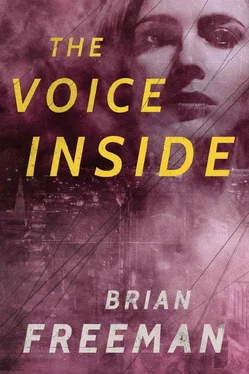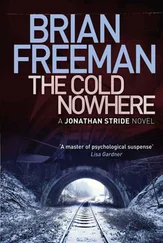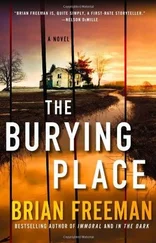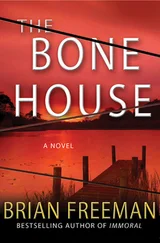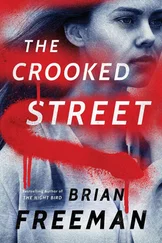He smiled, seeing one of Herb’s three-dimensional sidewalk paintings two stores down from the boutique. Herb’s paintings filled the Haight-Ashbury area, pointing tourists to his gallery a few blocks away. This one showed a young Jerry Garcia playing guitar, and it appeared to rise off the pavement so realistically that people detoured around the painting to avoid bumping into him.
“I’ve been searching the wrong streets for years,” Frost said as he looked up and down the block. “I followed every route from the pizza joint to Clary’s place a dozen times, but I went the wrong way. I assumed that Katie headed west, which is what she should have done. Except she didn’t. I never checked the streets going this way.”
“What were you looking for?” Eden asked.
“Any place where Katie and Cutter might have intersected. I studied his life. I studied his credit-card receipts. I did the same with Shu Chan, because I figured he might have been targeting her already. There was nothing that would have put them in the same area.”
Eden shook her head. “East, west, it doesn’t really matter, does it? If you’d found a connection close to here, it would have jumped out at you. A few blocks wouldn’t have made a difference.”
“You’re right about that.”
He stared at the boutique door. It was easy to picture Katie rushing inside before they closed, with the hot pizza in her car. She’d spot the Buddha fountain immediately; maybe she’d already seen it in the window. It was the perfect gift for their mother. She would have haggled over the price, but not much. Katie wasn’t a bargainer, and she didn’t have time to negotiate. She would have scribbled down their parents’ address for the delivery, probably had to write it out again so they could read it, and then she would have dashed back to her car to head in the opposite direction to Todd Clary’s place.
It still didn’t make sense to him.
“I always assumed that Katie stumbled onto Cutter on the delivery route,” Frost told her. “She saw something she wasn’t supposed to see.”
“That makes sense,” Eden said. “So maybe Shu Chan was in the Asian boutique that night, and Cutter was watching her. If Katie saw him near Shu, that would explain everything.”
Frost nodded. “I thought about that. And you’re right, it’s probably what happened, but it doesn’t explain everything.”
“Why not?”
“Because it doesn’t explain why Katie was in this store that night to begin with,” Frost said. “That’s what I don’t understand. She shouldn’t have been here at all.”
The owners of the Tibetan boutique didn’t recognize the photographs that Frost showed them. Katie Easton, Rudy Cutter, and Shu Chan were all strangers to them. They didn’t remember the purchase or delivery of one ceramic Buddha fountain six years earlier. It was a dead end.
Frost put it out of his mind for now and headed for Stonestown.
Hope’s mother, Josephine Stillman, was in her mideighties. She still lived in the same little white house on Eucalyptus Drive that she and her husband had purchased in the ’60s. She was one of thousands of elderly house orphans in California who enjoyed low property tax rates because of Prop 13, as long as they never sold their home. So they stayed put year after year, watching their net worth grow on paper. Josephine’s three-bedroom matchbox was probably worth two million dollars now.
She was spry for her age. When she opened the door for them, she was dressed for pickleball in a white skirt and cotton top. Her hair was colored to a delicate auburn. Her skin had the artificial tautness of someone who’d had work done. She didn’t pretend that she was happy to see them or that she welcomed the idea of talking about her daughter. Her attitude was busy and impatient.
“I really don’t have time for this,” Josephine complained, waving them into the house with a flutter of her hand. “And I don’t see how I can help you. Hope’s been gone thirty years. Honestly, I try to put all of that unpleasantness out of my head. I don’t think about it anymore.”
Frost knew that was a lie.
In reality, Hope stared down at her mother every day. There was a watercolor portrait of her over the fireplace in the living room. For Frost, it had a strange, haunting familiarity. He recognized Hope from photographs he’d seen, although the painting must have been done when she was a teenager. Even knowing what Hope would do a few years later, it was easy to see that she’d been an unhappy child. The face in the painting stared desperately into the distance. The watercolors, which blurred her features, made her look as if she had no identity at all and was in danger of disappearing into the canvas.
“Hope did that painting herself,” Josephine murmured when she saw him looking at it. “It’s the only self-portrait I have of her.”
“She was very talented.”
That was true. The craft in the painting was impressive, especially since she’d done it so young. But the girl who’d stared into the mirror as she made the self-portrait was obviously tortured.
“What is it you want?” Josephine asked. Then she rushed ahead, as if to answer their questions before they could ask them. “Back then, you know, people didn’t talk about mental illness. There was a stigma. And no one realized what postpartum depression could make a mother do. All they saw in Hope was a freak. A monster. That wasn’t her. She was sick, and no one could help her. Not her husband. Not even me.”
Frost could hear her voice quivering as she got upset.
“She wanted that baby, you know,” Josephine went on. “She did. She loved Wren. People didn’t believe that after what happened, but it’s true. She’d talked about having children for years. She was ready . She would visit pediatrics on her breaks at the hospitals and chat with the new mothers. She was over the moon when she got pregnant herself. She couldn’t wait to have a child of her own. It’s just that she had no way of knowing how it would affect her mentally.”
“We understand,” Eden reassured her. “We know Hope was sick.”
Josephine took a handkerchief and dabbed at her nose. “Well. You don’t know what we went through. The awful things people said. Jim couldn’t take it. That’s what killed him. I spent years living with the guilt myself, and finally, I decided I was going to put it behind me. What’s done is done.”
She didn’t sit down, and she didn’t invite them to sit down. She wanted to move this along.
“Did you stay in touch with Rudy Cutter?” Frost asked.
Josephine waved her hand. “No, no, no. Rudy and I never spoke again after the funerals. And mind you, that was his choice. Jim and I reached out, but he wanted nothing to do with us.”
“You know he’s been released?” Frost said.
“Oh yes.”
“Has he tried to contact you?”
“No, of course not. I can’t imagine why he would. I literally haven’t set eyes on Rudy in years.”
Frost glanced at the portrait again. He felt as if Hope were following the conversation. He had the strangest sensation that he’d met Hope before, but he didn’t know why. He didn’t know her as anything but a face in a picture, and yet he’d felt her presence with him somewhere. He couldn’t place it, but the time was recent.
“We think that Rudy’s killing spree is somehow an expression of his rage toward Hope,” Frost said.
“Don’t you blame my daughter for what he did!” Josephine snapped. “What Hope did was awful enough, but she was ill . She wasn’t in control of her mind. Rudy is the real monster. He has no excuse at all for the crimes he committed. None. Besides, I don’t know why you think there’s any connection. The things he did happened years later.”
Читать дальше
